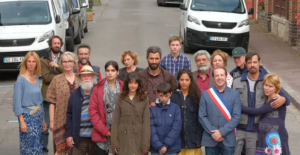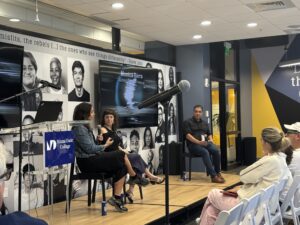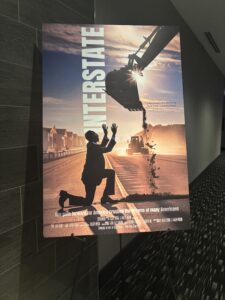Megan McLachlan is in Miami to cover the Miami Film Festival, which kicked off on April 3 with Julie Delpy’s Meet the Barbarians.
In its 42nd year, the Miami Film Festival has only gotten bigger.
This year, the programming includes more than 200 films, 80 shorts, and movies from around the world — including 12 from France alone, including Julie Delpy’s Meet the Barbarians, which kicked off the festival at the Olympia Theater on Thursday, April 3.
Meet the Barbarians Delivers Laughs with Topical Political Relevance

Unfortunately, Delpy wasn’t able to make the Miami Film Festival screening of her new film. But the gifted two-time Academy Award nominee had a good reason: Her shooting schedule shifted for Ruben Östlund’s follow-up to Triangle of Sadness, The Entertainment System is Down.
Meet the Barbarians is a movie Americans would be too afraid to make. Set in the small French commune of Paimpont, the community is ready to welcome Ukrainian refugees. . .until they discover that all the Ukrainian refugees have been housed! So they take in Syrian refugees, which causes tension among some of the more bigoted community members.
Delpy’s keen eye and pen deftly handle the conflict on both sides, presenting the Syrians’ story with respect and authenticity. And while the writer/director described it as a funny movie about a serious subject in her prerecorded message to the audience, Meet the Barbarians never feels like it pokes fun at anyone, presenting a straightforward story of people dealing with insecurities and fears they can’t understand. Even though it takes place in France, its message is universal. I can see why Delpy says it’s her favorite film she’s ever made. It’s very special.
MasterShots: Raiders of The Lost Archive & The Power of PR

Kicking off Day 2 of the festival was back-to-back MasterShots seminars. The first was on securing archival footage for documentaries.
“Why is the environment just declining? Why is the water sick? Why are there so many more buildings?” River of Grass director Sasha Wortzel revealed to an audience at the Idea Center the questions that sparked her documentary, an adaptation of Marjory Stoneman Douglas’s guide to the Everglades.
Relying on archival footage, some of which came from the Wolfson Archives (just a floor below us), Wortzel and her archival producer Monica Berra spoke at length about how documentaries incorporate historical footage into their final product, including the legal parameters and hours of footage they fall in love with. It was a fascinating discussion that really makes you look at docs like Fire of Love differently (which was all archival footage).
The second MasterShot discussion was led by 42West publicist Hilda Somarriba, who discussed everything that goes into marketing a film. She also delved into how Emilia Perez might change the game in terms of awards vetting.
“I think in a perfect world, we’d have the opportunity to [remove tweets],” says Somarriba. “I think we can ask [talent], hey, do you have anything potentially damaging to you on social media? But we wouldn’t have the power to go into their history to see if anything could be considered offensive. There are actually companies that can be hired to [go through tweets]. It’s usually the competition.”
Interstate is the First Documentary to Address the Racist Motivations Behind Our Highway System
 Did you know that the United States highway system displaced thousands of African Americans across the United States in the ’50s and ’60s? The new documentary, Interstate, thoroughly examines how these communities were affected, with interviews from victims as well as prominent figures like Pete Buttigieg.
Did you know that the United States highway system displaced thousands of African Americans across the United States in the ’50s and ’60s? The new documentary, Interstate, thoroughly examines how these communities were affected, with interviews from victims as well as prominent figures like Pete Buttigieg.
“We wanted to make sure a film like this wasn’t your average history lesson,” said Interstate co-director Haleem Muhsin. “We wanted to make sure it has an emotional impact as well.”
Muhsin and co-director Oscar Corral tell this story — something that’s never been a subject of a documentary before — by introducing audiences to the folks who were displaced and the people who are trying to amend these historical injustices in cities like Baltimore, St. Paul, Montgomery, and yes, Miami (specifically the Overtown neighborhood).
At only an hour in length, this doc is truly a fascinating, devastating study on systemic mistreatment in America.
Two Women is as Sexy and Fun as an Afternoon Romp with the Exterminator
Women being driven by sex has been a common theme on television and in movies lately (see: Dying for Sex), and Chloé Robichaud’s Two Women, a remake of 1970’s Two Women in Gold, adds to the conversation with a post-#MeToo take positing that sometimes women do want to be sexual objects. In this case, two bored housewives, Florence (Karine Gonthier-Hyndman) and Vivi (Laurence Leboeuf), start entertaining workmen (and women!) when their husbands ignore them.
Florence all but throws herself at a man who’s going to buy her drill from her (metaphor!), but he refuses to take the bait of her low-cut shirt because that’s not what she wants, according to society (even if it is what she wants and why she wore it in the first place). Two Women sharply creates rounded female and male characters, when it could easily slip into the men being positioned as villains. Instead, while the film highlights female insecurities, it also subtly portrays the male side and their attempts to conform to what society wants them to do.
Miami Film Festival runs April 3 through April 13.









